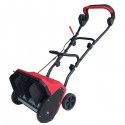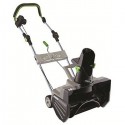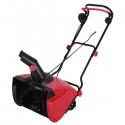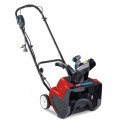Electric Snow Blower Reviews
These are the 10 best electric snow blowers based on product quality, customer satisfaction, and price:
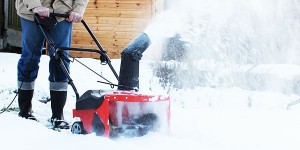 Electric snow blowers offer a number of excellent advantages over gas powered snow blowers. Two of the best reasons to switch to an electric snow blower over a gas powered snow blower are their noise level and carbon footprint. Unlike gas powered snow blowers, which can be incredibly noisy and literally have decibel levels that approach those produced by jackhammers and chain saws, electric snow blowers run virtually silent. This is an important feature, especially if you have neighbors. You never know when a winter snow storm is going to drop several inches in the middle of the night. And if you wake up to a driveway that needs to be cleared before you are able to leave for work, you can do it with an electric snow blower without having to worry about waking up your neighbors.
Electric snow blowers offer a number of excellent advantages over gas powered snow blowers. Two of the best reasons to switch to an electric snow blower over a gas powered snow blower are their noise level and carbon footprint. Unlike gas powered snow blowers, which can be incredibly noisy and literally have decibel levels that approach those produced by jackhammers and chain saws, electric snow blowers run virtually silent. This is an important feature, especially if you have neighbors. You never know when a winter snow storm is going to drop several inches in the middle of the night. And if you wake up to a driveway that needs to be cleared before you are able to leave for work, you can do it with an electric snow blower without having to worry about waking up your neighbors.
Gas powered snow blowers produce about one pound of carbon emissions for every hour of use, according to the Environmental Protection Agency. That is about the same level of emissions as a four-door sedan driving seventy miles. Small yard machines like snow blowers are responsible for about 25% of carbon emissions produced by mobile vehicles, a category that also includes automobiles, airplanes, and locomotives. As a result, switching to yard machines that run on electric power can go a long way to reducing your household’s overall carbon footprint.
Many consumers still opt for gas powered snow blowers in spite of their drawbacks because they do not believe that electric snow blowers have the kind of power and performance necessary to take care of bigger jobs. But this simply is not the case. Today’s biggest and most powerful electric snow blowers typically have motors that are 13 amps or more, and can support single stage augers that can clear widths of up to 20 inches or more and have snow cut depths of ten inches or more. With these dimensions, electric snow blowers are able to quickly and efficiently clear average suburban driveways, and can handle average and even heavier snow fall without any trouble.
Electric snow blowers have all of the advantages offered by a small gas powered single stage snow blower with none of the drawbacks. They are quiet and produce zero carbon emissions at the point of use, and you never have to count on having enough gasoline on hand. They will start up reliably every time without having to yank on a heavy starter cord or the engine being too cold to start.
If you have the typical suburban property, with a one- or two-car driveway and wide walkways, as well as a back patio or deck to keep clear, an electric snow blower could be just right for your needs. This is especially true if you do not live in a northern region of the United States that typically gets a number of heavy snow storms that drop more than a foot of snow at a time. These snow blowers are capable of providing the kind of power and performance to keep your driveway reliably clear of snow.
1. Electric Snow Blower Selection Criterias
1a. Power Source
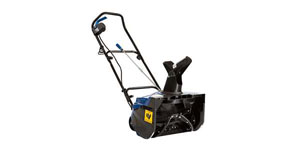 One of the important decisions you will have to make at the outset when you are shopping for an electric snow blower is whether to purchase a plug in or battery powered model. There are basically two schools of thought on this, because there are advantages and drawbacks to each style, depending on your needs.
One of the important decisions you will have to make at the outset when you are shopping for an electric snow blower is whether to purchase a plug in or battery powered model. There are basically two schools of thought on this, because there are advantages and drawbacks to each style, depending on your needs.
Cordless snow blowers are powered by rechargeable batteries, which can be traditional lead-acid batteries or lithium ion batteries. Machines with lead-acid batteries will be less expensive than lithium ion batteries. But on the other hand, lithium ion batteries recharge much more quickly, which can be useful in the middle of a big storm, and they generally hold their charge longer and can cover more distance than lead-acid batteries. A more powerful battery will be important if you are dealing with a heavier snow fall or wetter, heavier snow, as it will be able to provide more power to the auger to push the snow up through the snow chute.
The major advantage of battery powered snow blowers have over plug in models is that they are not limited in their range by the length of a power cord. If you have a particularly long walkway from your front door to the street, or if power sources are not conveniently located on your property, having a snow blower that is not tethered to a power cord can be very helpful. In addition, you will never have to worry about losing the power cord in the dark or in deep snow. Until you get used to using a power cord, this can pose significant problems: there is always the risk of accidentally running over the power cord and damaging it or the snow blower’s auger.
The main advantage plug in snow blowers offer as compared to battery powered models is that they will be able to run almost indefinitely. You never have to recharge a plug in snow blower between uses, which is particularly useful if you are experiencing a week of repeated heavy snow fall. If you experience three or four days of heavy snow fall in a row, a battery that needs fifteen hours to charge may not be ready from one job to the next. You can also always rely on a plug in snow blower to consistently offer the same level of power to the auger, which is useful if you are clearing deep or wet snow.
1b. Snow Cut Depth
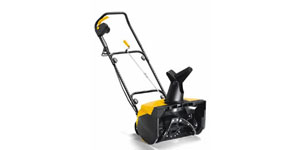 The electric snow blower’s snow cut depth and clearance width are two factors that will have a huge influence on the overall performance of the machine as well as the snow clearing experience as a whole. The snow cut depth describes how much snow fall accumulation a snow blower can reliably handle, and on electric snow blowers it generally ranges from six inches to twelve inches, and in some cases even a few inches more. A snow blower’s clearance width describes how broad a path can be opened by the snow blower’s auger, and in electric snow blowers it can range from fourteen to twenty inches, although the majority of them have clearance widths of eighteen inches.
The electric snow blower’s snow cut depth and clearance width are two factors that will have a huge influence on the overall performance of the machine as well as the snow clearing experience as a whole. The snow cut depth describes how much snow fall accumulation a snow blower can reliably handle, and on electric snow blowers it generally ranges from six inches to twelve inches, and in some cases even a few inches more. A snow blower’s clearance width describes how broad a path can be opened by the snow blower’s auger, and in electric snow blowers it can range from fourteen to twenty inches, although the majority of them have clearance widths of eighteen inches.
Snow blowers with wider clearances will be able to clear your driveway or sidewalk in fewer passes and more quickly, which means you will have to spend less time outside clearing snow in the cold. But if you only have a narrow walk or a small deck to clear, you may decide to opt for a narrower clearance width.
If you live in a region of the country that regularly receives heavy snow fall, an electric snow blower with the highest available snow cut depth makes a lot of sense. Snow blowers with higher snow cut depths allow you to handle deep accumulations of snow. With a shorter snow cut depth, you will have to be outside clearing snow fall while it is still accumulating to ensure it does not get too deep for the snow blower to handle. A machine with a higher snow cut depth will free you up to let snow accumulate in full before you go outside to clear it all in one fell swoop.
On the other hand, if you live in an area such as the Atlantic States that gets regular snow fall with lighter accumulations – about five or six inches at a time – an electric snow blower with the highest possible snow cut depth may not be necessary. It does not make a lot of sense to spend extra money on a machine with a higher snow cut depth on the off chance that you will see a once in a hundred year blizzard. These snow blowers are necessarily larger and have more powerful motors that will draw more power, and to support those engines they are necessarily a bit larger and heavier than snow blowers with shorter snow cut depths.
1c. Clearance Capacity
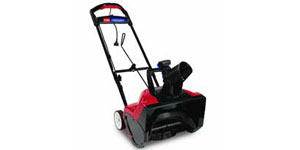 The electric snow blower’s motor is the major determiner of the machine’s overall power, and it will generally be the component that affects the size and ability of all of the other parts of the machine. Electric snow blower motors range from about 10 to 14 amps. Bigger motors generally require a larger overall infrastructure to support their girth, and they are generally heavier than smaller motors. Bigger motors likewise require a power outlet that is connected to a breaker that can handle a big amperage load. Some outlets, especially those in tool sheds or in older houses, may not have the necessary amperage load to handle a 14 amp motor, especially if you are running lights or other appliances off of it at the same time. Be sure you know the amperage load of your power outlet before you purchase an electric snow blower that draws too much power.
The electric snow blower’s motor is the major determiner of the machine’s overall power, and it will generally be the component that affects the size and ability of all of the other parts of the machine. Electric snow blower motors range from about 10 to 14 amps. Bigger motors generally require a larger overall infrastructure to support their girth, and they are generally heavier than smaller motors. Bigger motors likewise require a power outlet that is connected to a breaker that can handle a big amperage load. Some outlets, especially those in tool sheds or in older houses, may not have the necessary amperage load to handle a 14 amp motor, especially if you are running lights or other appliances off of it at the same time. Be sure you know the amperage load of your power outlet before you purchase an electric snow blower that draws too much power.
Therefore a machine with a motor that produces greater amperage will usually be heavier overall and have a larger footprint than one with a smaller motor. As a result, electric snow blowers with big, powerful motors are sometimes a bit bigger and heavier than some users may like. As with other criteria, the size of the motor is a bit of a balancing game; you want a machine that will have a motor that can provide enough power to support a high clearance capacity, but not one that is so heavy you will have difficulty maneuvering it around your yard. This is an especially important consideration if you are an older person or otherwise do not have the necessary strength level to handle a very large machine.
The amount of power an electric snow blower’s motor provides to the machine will largely determine the overall clearance capacity it has. Clearance capacity is defined by two parameters: the pounds of snow per minute the machine can move, and the distance the machine’s snow chute can throw the snow. Per minute capacity can range from about 450 all the way up to 750 pounds per minute, and throwing distance can range from 20 to 35 feet. Higher per minute capacity will allow you to not only clear deeper snow fall more quickly, but it will also allow your snow blower to be able to handle wetter, heavier snow more easily. Higher throwing distance will allow you to clear a wider driveway more easily, as it prevents you from having to go over the same snow more than once.
1d. Drive System
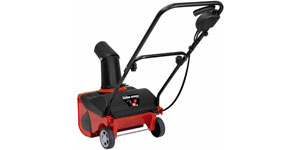 There are two kinds of drive systems that are available for electric snow blowers that are self-propelled. Many smaller electric snow blowers will not have drive systems at all, and require the operator to provide all of the power to maneuver the machine around the driveway. If you are looking at models that do not have self-propulsion systems, it is important to make sure you are getting a model that is compact and lightweight enough that you will not have any trouble maneuvering it around your property on your own.
There are two kinds of drive systems that are available for electric snow blowers that are self-propelled. Many smaller electric snow blowers will not have drive systems at all, and require the operator to provide all of the power to maneuver the machine around the driveway. If you are looking at models that do not have self-propulsion systems, it is important to make sure you are getting a model that is compact and lightweight enough that you will not have any trouble maneuvering it around your property on your own.
The first self-propelled drive system, and far more common of the two, is an auger propulsion. In this system, the auger not only is responsible for throwing snow up through the snow chute but also pulls the snow blower along with it as it does so. This is a fairly basic system, and there are limitations to it. It will be difficult to use this kind of propulsion system if you are clearing fairly uneven ground or working on a sloping driveway that requires you to move the snow blower uphill.
In addition, it is important to make sure that the auger on this kind of snow blower is made of the right kind of materials. You want the auger to be durable enough that it will not be damaged as it contacts the ground, but on the other hand, you also want to make sure the auger is not scraping or damaging the surface it is moving over. For driveways and concrete sidewalks, a hardened steel auger with rubber tips is best; for clearing patios and decks, a sturdy plastic auger should suffice.
The second self-propelled drive system is one in which the snow blower has a rear wheel drive that propels the machine independently of the auger. These systems are particularly useful if you have a driveway that slopes down a hill, as the rear wheel drive will be better equipped to push the snow blower up it. Rear wheel drives also tend to have much better traction than auger driven snow blowers, and can generally handle deeper snow fall more easily. A snow blower with an independent propulsion system will be able to tackle bigger driveways more easily, and also usually have a reverse setting, which is useful if you have tight corners on your property. On the other hand, rear wheel drives necessitate bigger motors and can wind up being more expensive.
1e. Price
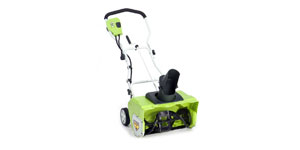 The general wisdom surrounding prices is that you always get what you pay for. A novice consumer might take that to mean that the most expensive item is always the best, but seasoned shoppers know that this is not always the case. There are a few additional things to look at when you are pricing out an electric snow blower, and by paying attention to them, you can be certain that you will make the best possible purchase and get the best value for your money.
The general wisdom surrounding prices is that you always get what you pay for. A novice consumer might take that to mean that the most expensive item is always the best, but seasoned shoppers know that this is not always the case. There are a few additional things to look at when you are pricing out an electric snow blower, and by paying attention to them, you can be certain that you will make the best possible purchase and get the best value for your money.
In the first place, more expensive electric snow blowers are usually more expensive because they are bigger, have wider augers, higher snow cut depths, and more powerful motors that allow them to have higher snow clearance capacities. More expensive snow blowers often have additional accessories as well, not to mention pricey features like rear wheel drives with multiple speeds. It is important to determine whether you need all of these extra features to keep your property clear.
As we discussed above, if you do not have a particularly large driveway or if you only have a narrow sidewalk to keep clear, it may not be entirely efficient to have a super wide auger on your snow blower. Likewise, if you do not live in a region that experiences particularly heavy snow fall from one storm to the next, an extra high snow cut depth may not be altogether necessary. Of course, this is not always the case: some of us do live in regions that experience rather heavy snow fall, and an extra three or four inches of snow cut depth can make a world of difference. And anyone who lives on a hill can attest that a robust rear wheel drive on their snow blower is worth every penny.
Beyond that, however, I have found that there is a wide range of price variance from one model to the next, even when the two models are nearly identical in almost every important product spec. Snow blowers with the same power motors, same clearance widths and snow cut depths can vary in price by hundreds of dollars. It’s important to make sure that you are getting the best bargain on your snow blower, but also getting a machine that will provide reliable performance over a number of years. The best way to do that is to carefully read product reviews and do serious comparison shopping.
2. Best Electric Snow Blower Reviews
Greenworks 26032 




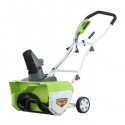
The Greenworks 26032 has the kind of extra wide 20 inch clearance that will cut down on the number of passes you will have to make in order to get your driveway cleared more quickly. It can clear the average sidewalk in just two passes, which means it will be able to clear your driveway [...]
Snow Joe Ultra 622U1 




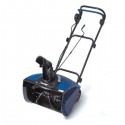
The Snow Joe Ultra 622U1 has everything you need to keep your driveway clear of snow – even deep, heavy snow – all winter long. This is one of the few electric snow blowers that is ETL approved, and it earned that approval rating because of its impressive ability. The Snow Joe Ultra 622U1 can [...]
Yard Machines 31C-040-800 




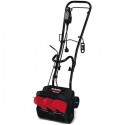
The Yard Machines 31C-040-800 is equipped with everything you need to clear moderate snow fall from your driveway and sidewalks quickly and efficiently. This compact snow blower is a great alternative to shoveling, because it not only takes less time with the Yard Machines 31C-040-800, but you also will not wind up with a sore [...]
DuroStar SD1300 




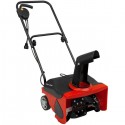
The DuroStar SD1300 is perfect for taking care of smaller areas that have a moderate accumulation of snow fall. If all you have to take care of is a shorter driveway and a few walkways, this is the perfect snow blower for you. As an alternative to big, noisy gas powered snow blowers, the DuroStar [...]
Snow Joe SJ622E 




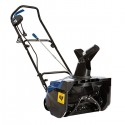
The Snow Joe SJ622E is one of the more outstanding electric single stage snow blowers I have seen, and it really offers a solid alternative to gas powered models. It has a comparable clearance width and snow cut depth to the majority of gas powered single stage snow blowers, and it has a higher per-minute [...]
These are the 10 best electric snow blowers based on product quality, customer satisfaction, and price:

